Unlock the Editor’s Digest for free
Roula Khalaf, Editor of the FT, selects her favourite stories in this weekly newsletter.
Israel says it has withdrawn its troops from Khan Younis in southern Gaza in order to prepare for operations in Rafah, Hamas’s last stronghold, despite US warnings that a big ground offensive on the town would be a mistake.
“Our forces left the area in order to prepare for their future missions, including their mission in Rafah,” Israeli defence minister Yoav Gallant said after meeting senior officers of the army’s southern command.
An army statement said the minister had been briefed on preparations for the destruction of Hamas’s Rafah Brigade, “an achievement which will finalise the dismantling of Hamas as a military authority in Gaza”.
The move to pull out of Khan Younis effectively closes a phase in the ground offensive against Hamas and came as Israel and the militant group sent teams to Egypt for more talks on a potential ceasefire in the six-month war.
The negotiators’ positions remain far apart; Hamas wants an end to the war and the withdrawal of Israeli forces, while Prime Minister Benjamin Netanyahu says the war will not end until Hamas has been destroyed. He has also said no deal will be made without the release of the 130 or so hostages the militant group continues to hold.
But the ceasefire talks come with Israel under increasing US pressure to change its approach, do more to avoid civilian casualties and improve the humanitarian situation. That pressure ratcheted up last week after seven aid workers from the group World Central Kitchen were killed.
US President Joe Biden warned last week that American support for Israel in the war would depend on its efforts to address the humanitarian suffering, and he called for an “immediate ceasefire”.
Palestinian health authorities say more than 33,000 people have died in Gaza since the start of the war, which was triggered when Hamas launched a cross-border raid into southern Israel that, according to Israeli officials, left 1,200 people dead.
Israel has insisted on the need to attack Rafah, near Gaza’s border with Egypt, which is Hamas’s last stronghold. “We will not leave any Hamas brigades active — in any part of the Gaza Strip,” General Herzi Halevy, chief of the general staff, said on Sunday evening.
But Israel’s allies have expressed deep misgivings about any potential move on Rafah, where more than 1mn Palestinian civilians, many of them displaced by the war, have taken shelter.
The US warned last month that any major ground operation in the area would be a “mistake” that would lead to more deaths of innocent civilians and worsen the already dire humanitarian crisis. Israel has insisted it will evacuate civilians before launching an attack.
Halevi said Israel was “far from halting” its war, despite removing some of its troops, and had not yet fully achieved its objectives, chief among them the return of the remaining hostages held by Hamas and the destruction of the militant group “throughout the Gaza Strip”.
“Senior Hamas officials are still hiding,” he said. “We will reach them sooner or later.”
He also said Israel was prepared for any retaliation against it by Tehran for the strike on the Iranian consulate in Damascus last week. Widely blamed on Israel, seven members of Iran’s Revolutionary Guards were killed.
The leader of Lebanon’s Hizbollah militant group said the strike on the consulate marked a “turning point” and vowed that Iran’s response would be “inevitable”. Israel has not said it carried out the attack.
Halevi said the Israeli army “knows how to deal with Iran — offensively and defensively”.
“We are prepared for this. We have good defensive systems and we know how to act forcefully against Iran in both near and distant places,” he said.
